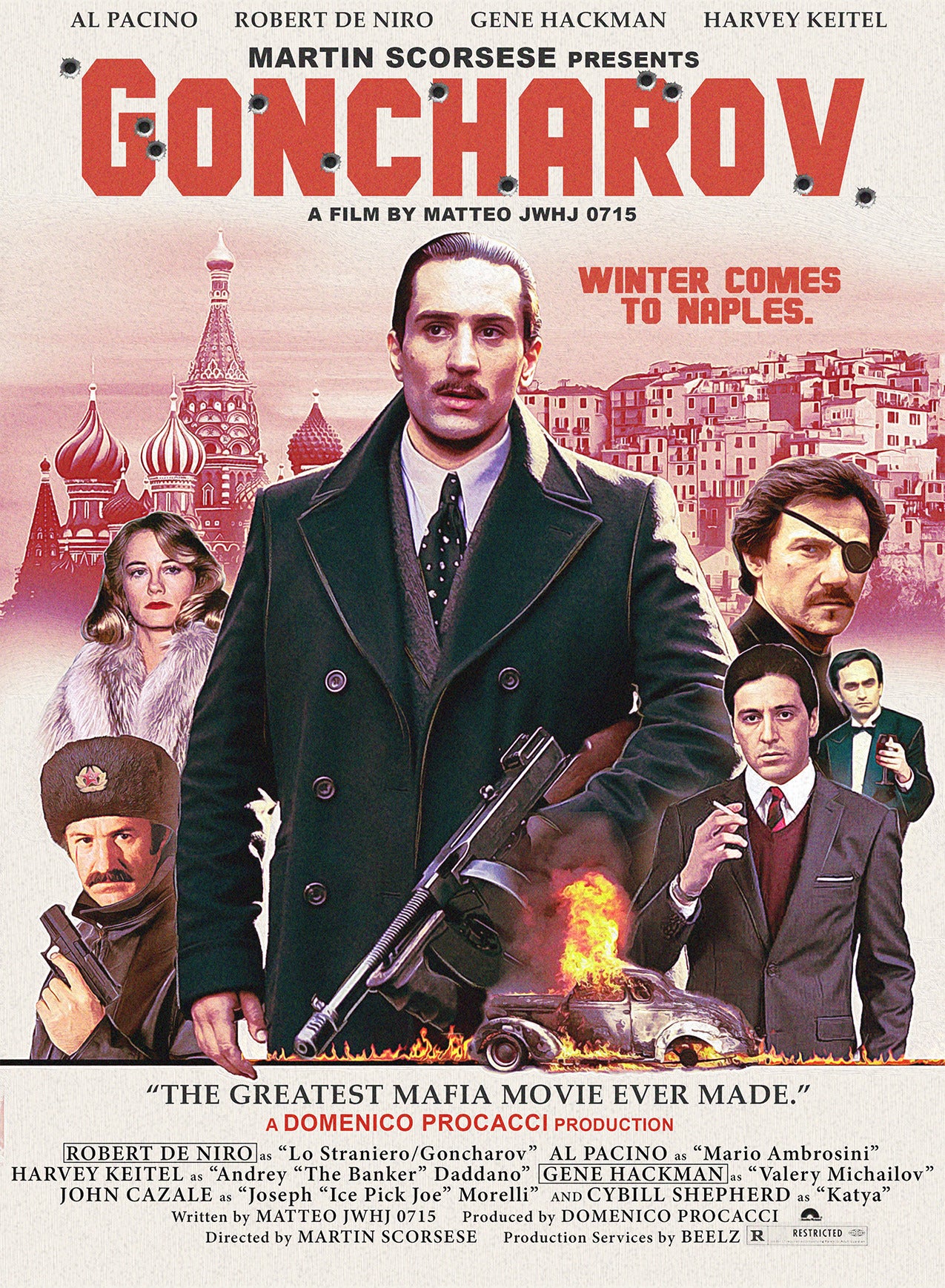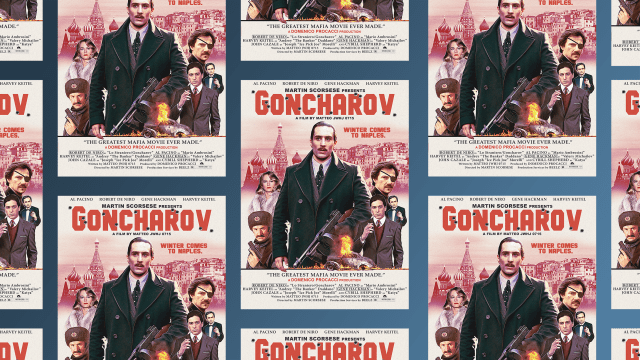If you were online, and specifically on Tumblr, over the weekend of November 18-20, you’ve definitely heard of Goncharov (1973). Widely considered one of Martin Scorsese’s lost masterpieces of Mafia cinema, it was released in 1973 but suppressed in the states for various reasons. Alternatively, it was never released. Or, in another timeline, Goncharov won several awards and is already in the Criterion Collection. Everyone agrees that all this is true.
With complete sincerity, Goncharov (1973) is (if you hadn’t guessed already) an entirely made-up movie. What has happened on Tumblr over the course of only a few days is nothing less than an exquisite corpse of collective unreality, all kicked off by a fake movie poster made by Tumblr user Beelzeebub, based on a photo of a knockoff merchandising boot. Beelzeebub, a full-time artist living in the Czech Republic, spoke to Gizmodo on the phone last night, saying that the response was “wonderful, but very overwhelming.”

Although the original post by user trufflesmushroom is two years old, after Beelzeebub’s posted their fanart on November 18, Tumblr users latched onto Goncharov (1973) and began to engage in a mass-mythmaking. Within days there was a huge fandom for the film, which had an ever-expanding cast, multiple plot lines that many users generally agree on, gifsets, fanart, universal themes and visuals, and even pseudo-essays from invented academics which have been published in unreal journals.
The energy, mass, and sheer unhinged enthusiasm that Tumblr has wholeheartedly embraced this “lost Scorsese movie” with is an inspiring example of collective storytelling and spontaneous fandom generation, inspired by the community itself. Essentially, Goncharov (1973) is not a film, but a game. And only Tumblr knows the rules, because the rules of Goncharov (1973) are the rules of Tumblr itself.
What is Goncharov (1973) about?
The specifics of the plot of Goncharov (1973) are, as you would expect, mercurial. Most would agree that Goncharov (1973) is the story of a group of Russian mobsters who are living in Naples. What is absolutely true is that Goncharov (1973) stars Robert de Niro as Lo Straniero/Goncharov, Harvey Keitel as Andrey (or Andrei) “The Banker” Daddano, and Cybill Shepherd as Katya Michailov. Al Pacino also makes an appearance as Mario Ambrosini and Gene Hackman is Joseph “Ice Pick Joe” Morelli.
These characters were all created by Beelzeebub, who illustrated and named them, and who also clarified (on the poster) that the film was written by Matteo JWHJ 0715 and directed by Martin Scorsese. These are the only truths of Goncharov (1973), but even then people like to imagine that it was actually directed by Matteo JWHJ 0715 and not Martin Scorsese, but that’s a fandom problem. The truth is right there on the poster! There is also a second female lead, Sofia, played by Sophia Loren, although she was added to the fanon after the poster was produced. According to Beelzeebub, “what makes this fandom unique is that beside the character’s names, there is no other canon. People can do whatever they want.”
Beelzeebub was inspired to create the characters and the poster because they thought that it would be something that “maybe 10 of my mutuals would like.” They’ve created fake movie posters before, so the fact that this was a movie based on knockoff merchandise (widely considered to be a computer-generated misprint of the film Gomorrah) “just seemed funny.” Beelzeebub is, naturally, a big Scorsese fan, and while they are “shocked” at the reaction, they say that they are having a lot of fun watching everything happen.
Fandom seems to agree that Goncharov is a Russian gangster of some kind who has come to Naples with his wife, Katya. There is a lot of murder. Goncharov and Andrey (and also sometimes Goncharov and Mario) have a latent homoerotic tension, stemming from their anxieties regarding time and legacy. Katya and Sofia are doing their best to stay under the radar and also explore their own personhood, while also dealing with a lot of forbidden-fruit metaphors and the idea of women as the originators of sin. You can see that Scorsese’s own oeuvre has played into these ideas. Much of this is up for debate.
How do you play Goncharov (1973)?
The game is easy to understand. You are roleplaying someone who has seen Goncharov (1973), Scorsese’s lost masterpiece, and you post about it on Tumblr. You can post by adding to the visual lexicon of the film such as creating fanart, gifsets, or even threads about the costume design. You can engage in direct movie development/scene creation; one example is powerbottombrucespringsteen’s short message:
“When Katya said “Of course we’re in love. That’s why i tried to shoot you.” And Goncharov said “If we really were in love you wouldn’t have missed.” 😵💫😵💫😵💫.”
Which then spurned cascading reactions and world building, culminating in sword-of-stardust’s response;
“This, and then when Andrey kills Goncharov at the end… Andrey didn’t miss.”
You can also play Goncharov (1973) by posting memes, applying common formats to the film, and adding to the community understanding of reactions to the film, which is emulating a fandom. This is a crossover move, usually taking both visual additions and scene building. The OT3 post by hannycat922 is a great example of this.
Additionally, you can play by posting meta responses about the film, moving Goncharov from into the real world and establishing it firmly in a kind of uncanny valley of unreality. So you can play by posting bits like my own Goncharov post — which read, simply, “I do not have time to become obsessed with Goncharov again I really don’t I saw it in college 10 years ago and I became mentally unwell unwell for three semesters” — but also fake Letterboxd reviews, newspaper clippings, and excerpts of pseudo-academic papers and essays.
This is where people like wondersmith-and-sons are writing posts that begin with “Chapter. 5.2: A Roman soldier or a Dane? Goncharov (1973) and the post-modernist framework” and end with “ — Francine Rubek, Violent Delights, Violent Ends: On Queer Readings of Masculine Tragedy (2003, Oxford University Press)” This is also where we get posts like clementine-kesh’s writing, which begins “Excerpt from Haunted by the Narrative: Fictional Fiction at the End of the Early Internet Era, by H. Ma and T. O’Neill. Published in the Journal of Digital Archeology, Issue 43, pp. 87-93, May 2094.” (Also, this post, by loverboygf, made me chuckle.)
It has to be noted that there is already fanfiction of Goncharov (1973), where people are rewriting a movie that has never been made. More or less overnight, a fake movie poster has inspired over 300 pieces of fanfiction. While the Archive of Our Own operates outside of Tumblr, the two communities are intricately linked. Posting on AO3 is another way to earnestly and consciously play the game of Goncharov (1973).
I’m sure there are other modes of gameplay; I can’t possible catalogue them all. But most posts seem to fit in one or more of these three categories. Regardless of taxonomy, all the users playing Goncharov (1973) apply the commonly-accepted aesthetics and community of Tumblr culture in a way that is completely unique to the social media site. There are no rules beyond the unspoken rules of Tumblr, which are generally pretty flexible to begin with.
Why do people care about Goncharov (1973)?
Truly there will be dissertations written on this whole Goncharov (1973) phenomena, but there seems to be a few key reasons why this game has taken off on Tumblr. The first is that Tumblr has fostered a culture that loves an in-joke. When one user posted a tongue-in-cheek response to the knockoff boots that said simply “this idiot hasn’t seen goncharov” everyone bought in. The backbone of improv storytelling, the “yes-and” method of fandom celebration, has always been a part of the Tumblr culture, and as people continued to add to the mythos of this fake film, they added in their favourite parts of fandom while also keeping their mode of expression enmeshed in the cultural folkways of Tumblr. After all, playfulness, enthusiasm, and fandom are core tenets of Tumblr’s user base.
Another reason that people latched onto Goncharov (1973) is because Scorsese has a distinctive aesthetic, especially when it comes to Mafia films, a massive body of work, and a cast of actors that he has consistently worked with. So besides the fact that it was fun to create a fake Scorsese film from the ‘70s, it was also easy. Even as details shifted across the site, the themes, ideas, and pillars of Goncharov (1973) remained the same because of the established archetypes, motives, and communal understandings of the genre that Tumblr users are working within as well as the user’s understanding of Scorsese’s own (real) films.
Goncharov (1973) is also new, shiny, and ultimately an incredibly low-stakes fandom. It’s not really real, therefore everyone is correct, and nobody really has any unilateral say over what is or isn’t true. It takes the subjectivity of interpretation and goes one step further, creating a subjective text, bypassing the media and going right for critical analysis and community.
Gaslight, Gatekeep, Goncharov
Within Tumblr culture there is a deep sense of both playfulness and absurdity. Creating a whole film and its history within the cinematic output of America based on a single piece of fanart that was made as a joke after a misprinted shoe advertising a film went semi-viral two years ago should feel weirder than it is. But for Tumblr this isn’t bizarre simply because Goncharov (1973) is a native Tumblr game that you can only play on Tumblr. It is an expressive culmination of fandom culture, analysis, and an incredible celebration of the creativity that is at the heart of the social media site. The importance of Goncharov (1973) isn’t the canon; it’s what you do with it.
If you have an old Tumblr account now might be the perfect time to brush it off and jump in. Between the Twitter exodus and the unreality of Goncharov (1973) absolutely conquering the site, there’s really no better collaborative social media experiment to be a part of. Just remember, Goncharov (1973) is absolutely a real film, and if you haven’t seen it, there’s probably a reason for that. You should post about it.
As Goncharov (1973) continues to spread throughout the Tumblr-verse and through the collective consciousness of unreality, you can expect it to get even weirder, wilder, gayer, and more layered as time goes on. The game is an earnest, clever moment of self-awareness for each user that plays because this is exactly what fandom on Tumblr is like. Goncharov (1973) is fun because users are both poking fun at themselves and inviting everyone else to be a part of the joke. The game of Goncharov (1973) embodies what many people love about Tumblr: an interpretive fandom experience where everyone is right, because nothing is wrong.
Want more Gizmodo news? Check out when to expect the latest Marvel, Star Wars, and Star Trek releases, what’s next for the DC Universe on film and TV, and everything you need to know about James Cameron’s Avatar: The Way of Water.
